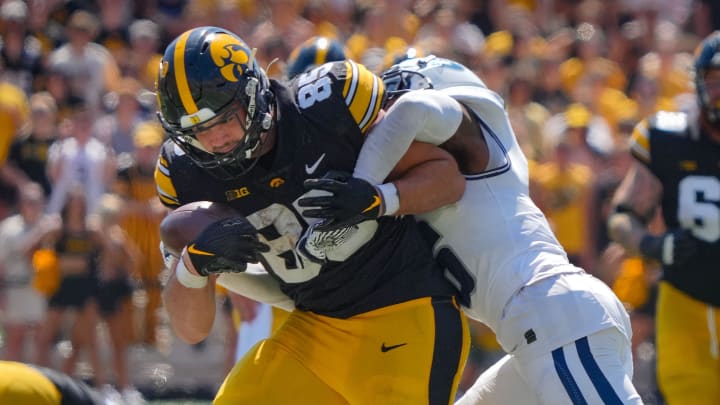Luke Lachey Has Unfinished Business

The ankle injury that ended the season of Iowa tight end Luke Lachey has healed after surgery and six months of rehabilitation.
Lachey’s confidence in coming back from the injury has also grown over time, which is why he figures to be a major factor in the Hawkeyes’ offense again this season.
Lachey was on his way to a big season before he went down with an injury to his right ankle in Iowa’s 41-10 win over Western Michigan in the third game of last season.
Now, he wants to make up for that last time, which is why he decided to return to the Hawkeyes instead of entering the NFL Draft.
“I just felt like there was more to prove, just going out there and playing, being there with my teammates again,” he said. “I just didn’t want that to be my last play in Kinnick Stadium, thinking about that injury the whole time. I felt like there was more I could do.”
Lachey had 10 catches for 131 yards in the Hawkeyes’ first two games last season and was poised to have one of those seasons that Iowa tight ends have become famous for over the years. Instead, he had to sit out as the Hawkeyes’ offense sputtered.
That time off, Lachey said, was an education.
“It’s definitely motivating,” he said. “You never want to be off the field. I’d say I’ve learned a lot about myself. You start to figure out a new role when you’re not out on the field, as far as leadership goes. I just feel like I learned a lot in the sense of patience, how to take care of your body when you’re out on the field.”
Lachey’s response last season was encouraging to Iowa coach Kirk Ferentz.
“I think we all suspect and know that he's a really good football player, but I think maybe as impressive as anything I saw was the way he handled a very disappointing injury last year,” Ferentz said at Big Ten media days in Indianapolis in late July. “He was fully engaged, fully immersed, and did a great job working with the other guys that were playing where he was supposed to be playing.”
Lachey said he was concerned about how the ankle would feel the first time he ran a pass route. When it felt fine, he said, his confidence improved.
“That’s one of the biggest things, the mental thing,” Lachey said. “You’re never too sure what can happen in a game. No one is. It’s a physical game. You’ve got to go out there and approach it the right way, and have fun with it. It felt amazing when I ran that first route.”
Lachey will be entering his fifth season, and Ferentz knows how much experience has mattered for his tight ends in the past.
“You look at a guy like George Kittle, who really has continued to improve, and he's playing at a much higher level -- he was starting to play at a much higher level at age 25 than he was at age 21,” Ferentz said. “That's what good players do, they just keep getting better.”
Lachey spent the spring and summer learning the offense under new offensive coordinator Tim Lester.
“One common takeaway, if you look at all the tight ends we've had, they come in different sizes, speeds, makeups, but they've all found ways to really impact the game,” Ferentz said. “Luke certainly fits that. He's more of a conventional tight end, can block in line, but also be a real threat in the passing game.”
“I’m lucky that I have four years of prior experience of knowing an offense,” Lachey said. “So it’s just trying to apply what I know to the new offense, like, ‘Oh, this (call) is this, and this is what we used to call it.’ So I try to think about that when the play is called.”
